Psoriasis is a silver scaly pink rash. It is itchy and occurs in millions of people around the world. If a person or loved one doesn't have such a rash, this doesn't mean they won't appear. It is important to start treatment in the early stages of psoriasis and not to let the disease begin to worsen.
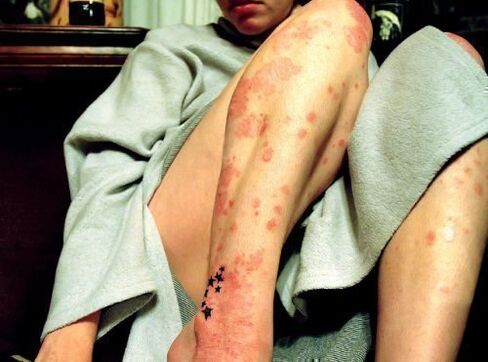
Psoriasis can be inherited, but not in all cases.
Characteristics of the disease
Psoriasis is not an infection and the cause of its appearance is considered to be a violation of the functions of the immune system. It can also result from external factors, skin trauma, stress, alcohol, antibiotics, infections.
Sores can cover any part of the body. The rash is especially common on the arms and legs. They also appear on the palms of the hands, feet, scalp and fingernails.
Psoriasis is a chronic disease with an undulating course. The person may experience periods of less rash or cause exacerbations. Relapses can be triggered by various external factors.
Psoriasis does not affect a normal life and does not require constant hospitalization. Even so, it is a serious pathology, with many inconveniences and limitations.
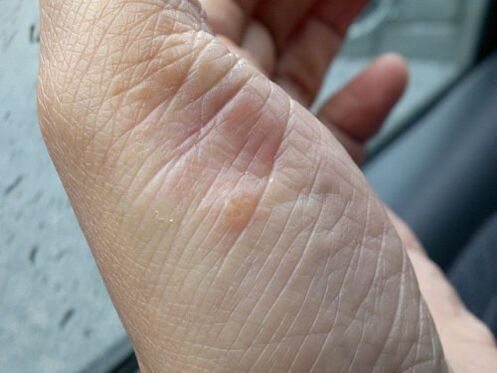
Symptoms of psoriasis may be fading and almost invisible.
Conditional division of psoriasis
There are several forms of psoriasis:
- impolite;
- sebum secretion;
- teardrop-shaped;
- palmar-plantar;
- psoriasis on the genitals.
The most common psoriasis is the vulgar form. With it, there are edematous rashes of a light color, accompanied by intense itching.
There are three degrees of psoriasis, depending on the size of the affected area:
- Light-weight. About 3 percent of the skin is affected.
- Average. The number of rashes ranges from 3 to 10 percent of the skin's surface.
- Heavy. A rash covers 10 percent or more of the skin surface.
Sometimes the disease gets into the joints. This is the most severe, no matter what percentage of the skin is affected by plaque. It can lead to the development of psoriatic arthritis, accompanied by pain and swelling in the joint parts of the bones.
There are three stages of psoriasis depending on the severity of the exacerbation:
- progressive;
- freeze;
- regression.
Even a doctor may not always be able to recognize psoriasis at a particular stage. In many cases, it is necessary to monitor the development of the disease specially. This will help determine if the psoriasis is in remission.
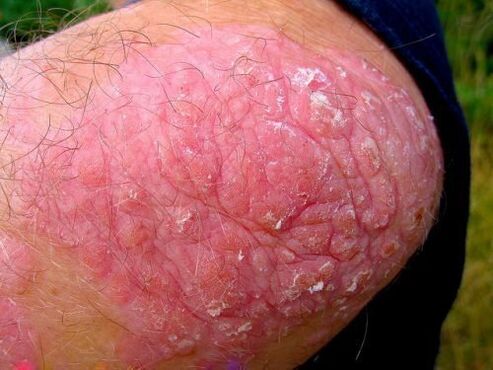
Psoriasis vulgaris has a bright pink color.
Progressive stage
In the early stages, psoriasis develops quite quickly. Different rash appears on the arms, back, buttocks, and legs, and they develop over time and form plaques. Progressive disease is characterized by itchy, wet, and potentially infectious lesions.
Psoriasis in its early stages is treatable. Therefore, it is important to have an accurate diagnosis on time. At the first symptoms of psoriasis of the early stages, you should consult a doctor. Only he can determine the nature of the skin disease and the stage of its development.
You can independently understand what psoriasis looks like with a number of signs:
- The rash appears on places where clothing comes in close contact with the body. For example, on the arm in the elbow area, under the pants, the elastic.
- Itchy rash is covered with gray scales.
- If you remove the flakes, you can see the thin, moist skin underneath.
- The condition of the nail is disturbed, dents appear on them.
Do not use any ointment without consulting your doctor. The use of certain remedies in the early stages of the disease can lead to the formation of stretch marks, thinning of the epidermis and being addictive.
Usually, the doctor will prescribe a medication that does not contain the zinc hormone. This is an effective remedy that allows you to reduce itching, reduce skin cell proliferation and inflammation, restore the protective functions of the skin and reduce the development of psoriasis at an advanced stage. development.
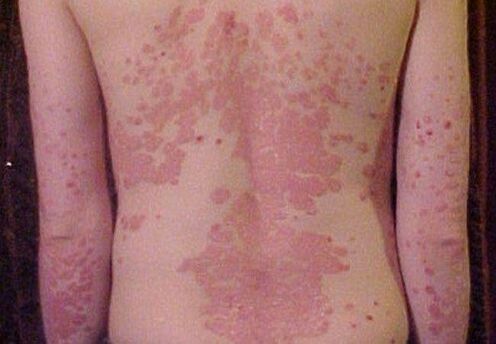
Psoriasis mainly appears in places that come into contact with skin and clothing.
Stationary stage
The previous phase is replaced by the stationary phase of psoriasis. Inflammatory nodules do not go away, but they do not develop. The plaques dry up and the inflammation subsides.
For the treatment of the stationary phase of psoriasis, tar-containing preparations are very often used. Sometimes systemic therapy is used and the body is affected by ultraviolet radiation.
Depression period
This is the final stage of psoriasis, in which the plaques begin to shrink and slowly disappear. Resorption occurs from the middle of the ulcer and towards the end of this period, small rings and patterns remain on the skin. Itching and peeling disappear. After the rash, barely noticeable pigmentation areas remain on the skin.
This process is the end of the psoriasis cycle, but it is not a complete recovery. The disease can recur at any time. If it is not treated, then the plaques will appear frequently.
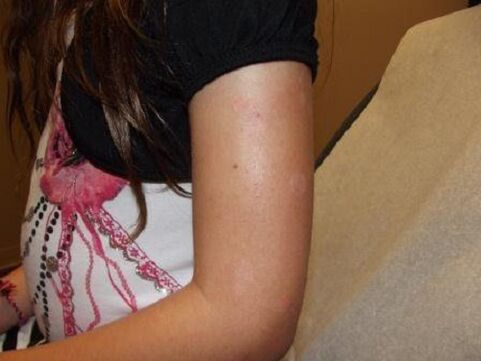
After the psoriasis, spots and patterns may remain on the skin.
Treatment and prevention of psoriasis
Each person should monitor their own health and increase attention to skin:
- Avoid hard towels that can scratch your skin.
- It is better to use specialty shampoos. This is especially true for psoriasis of the scalp.
- Care should be taken with the optimum humidity of indoor air to avoid excessive drying of the skin.
- Avoid scratches, injuries and cuts on the skin.
- It is necessary to follow a certain diet to improve the course of the disease.
- One of the main precautionary rules is to refuse alcohol. You should not drink alcoholic beverages and quit smoking.
- Wear loose fitting clothes so as not to cause cracking.
For the prevention and treatment of psoriasis, special massage methods are used. It improves blood circulation so the skin is cleaned faster. Body areas around the plaques stretch a few centimeters and then return. The procedure takes about 15 minutes.
Symptoms of the disease occur in the context of psychological stress. Therefore, it is important to keep stress to a minimum. They recommend practicing different relaxation techniques, getting enough sleep and more rest, using herbal preparations and sedatives.
Some patients use home remedies. To do this, use various herbal infusions and decoctions, egg and lard ointments, garlic compresses, and bedtime lotion. Alternative methods should be used after consulting a specialist.
Some medicines can cause relapses and side effects. They should only be taken as directed by your healthcare professional. Unfortunately, there is no one drug that can 100 percent eliminate psoriasis forever. You can only keep the disease in remission by choosing the right drugs.

























